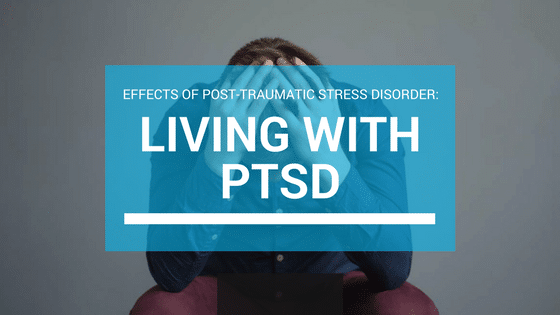You have to be living under a cave or without a television or computer to know that we live in a traumatic world in which horrific events are played out before our eyes nearly every week. Tragically, many people who are victims of trauma suffer from a condition known as post-traumatic stress disorder (PTSD.) In fact, more American military service people are suffering with PTSD today more than ever before, although only 10 percent of them have actually participated in combat.
Besides military combat, PTSD can be the result of accidents, terrorist attacks, natural or man-made disasters, physical attacks or being kidnapped. It can even be caused by receiving a disturbing medical diagnosis. If you’re unfamiliar with PTSD, here are some its effects and what it can be like to suffer from post-traumatic stress disorder.
On-going Flashbacks
People suffering from distressful events can struggle with on-going flashbacks of their traumatic experiences. In addition to having nightmares during sleep, they can also battle daytime flashbacks that can be so authentic that it can seem as if they’re reliving the event.
Ordinary, everyday occurrences can serve as triggers. Something as simple as rainfall can set off a flashback for someone who has survived an automobile crash that occurred during rainy weather.
Hypervigilance
People who live with post-traumatic stress disorder cannot take a break from staying alert for danger. This condition, which is known as “hypervigilance,” can cause extreme anxiety. As a result, it can be very difficult to fall or stay asleep. Hypervigilance, which is enhanced sensitivity, is obvious to others who observe signs of irritability and agitation in people with PTSD.
Avoidance
It’s common for people who have PTSD to use distractions as an escape for constantly having to relive their unpleasant experiences. Some people simply refuse to discuss what happened to them. Others find hobbies to keep them distracted, so they don’t have to think about their experiences.
Sometimes, people delve into their work, putting in long hours at their jobs. Being overly obsessed in working crosswords puzzles or aimlessly staring at a TV or computer screen for hours can be another way to avoid recalling a painful image or memory.
Feeling Numb
Many victims of PTSD try to manage their pain by shutting down emotionally, meaning they try not to feel anything. Emotional numbness can entail not talking with other people out of fear of having to review painful happenings. As a result, it can be challenging for co-workers and family members to work or live with PTSD victims.
Physical Effects
Not only can PTSD affect people mentally, but it can also cause physical symptoms. Some of the most common physical symptoms linked with PTSD include diarrhea, muscle aches, headaches and irregular heartbeats.
Studies have shown that PTSD can also compromise a person’s physical condition. For example, children suffering from neglect and abuse are more likely to develop ischemic heart disease, cancer and chronic lung disease.
There’s a strong link between going through trauma and needing more medical care for treating physical issues. Women who’ve undergone abuse in childhood tend to especially have more health issues than those who were not mistreated when they were young.
Furthermore, research has indicated that PTSD can affect a person’s musculoskeletal and gastrointestinal systems. Most of these studies involved veterans, even though there also have been studies of civilians with PTSD who’ve suffered from gastrointestinal symptoms.
Considerations and Warnings
- Common PTSD symptoms can emerge right after a traumatic occurrence. But in most cases, they typically start within six months following the experience.
- PTSD can cause people to lose interest in things that they once found enjoyable.
- Children with PTSD can worry about not living long enough to see adulthood.
- Often people who struggle with PTSD suffer from depression, eating disorders and substance abuse.
- Just witnessing or hearing about a traumatic experience of a close friend or family member can cause a person to develop PTSD.
Fortunately, PTSD can be easily treated. If you’re a therapist, you need to know about a highly successful treatment, known as Accelerated Resolution Therapy (ART). The development of ART‘s Voluntary Image Replacement evolved from traditional psychotherapies that reprogram how disturbing images and memories are stored in the human brain such as Gestalt and CBT among others. Please contact us and learn more about how you can help your clients overcome PTSD.

